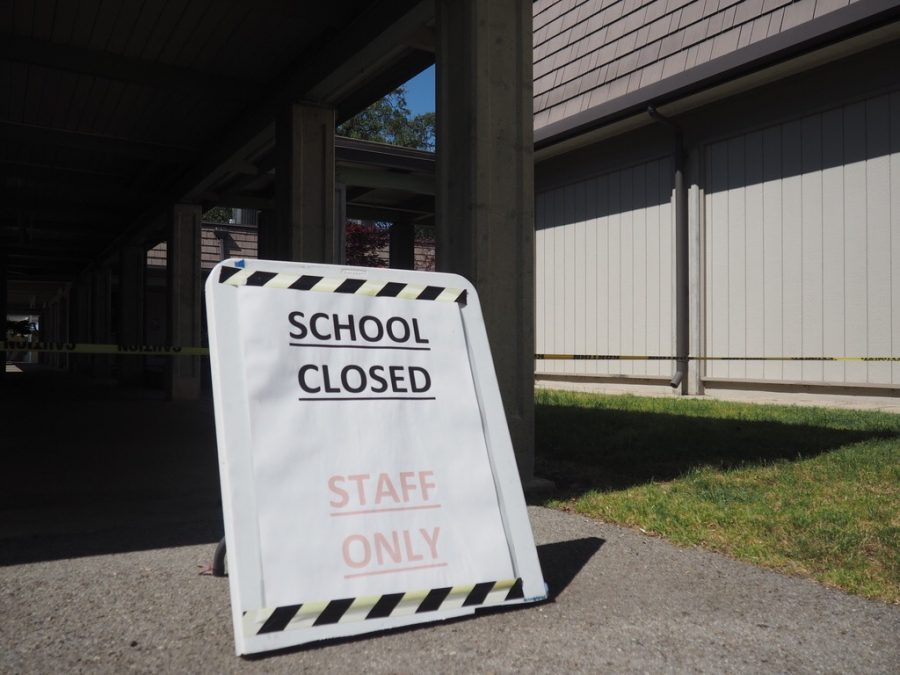District Imposes Educational Changes Due To COVID-19
To ensure the safety of students while also dealing with trade-offs in the education experience during COVID-19, schools worldwide have been forced to enact changes to ensure the safety of their students. In the Palo Alto Unified School District (PAUSD), some of the changes that the administration has made include budget cuts, a transition to a credit/no credit grading system, new structures for classes in the fall semester and standardized testing accommodations.
One of the major changes to the spring semester has been a shift to a credit/no-credit grading system. PAUSD was one of the first school districts in the country to transition—other districts have since followed. According to Superintendent Don Austin, the decision was made due to a lack of ability for teachers to transition quickly into online learning without sacrificing grading efficiency and accuracy. “Everyone around the country is dealing with this crisis,” he said. “There’s no way to have virtual classes be equivalent to in-person learning opportunities.”
For students, one concern about the system was the lack of transparency in transition. “I think it was a good solution, but there were definitely better ways to approach it,” junior Tiffany Chen said. “They could have first asked for student and parent input.”
Some parents were also skeptical of the decision. During the April 21 board meeting, parent Sudeshna Raha voiced concerns over equity for students who have worked hard to excel in their classes, yet due to the credit/no-credit system, are unable to receive recognition. “I feel what has been done with credit/no credit is inequitable to students taking honors and Advanced Placement classes,” she said. “They are putting in the work and they have been putting in the work, but they don’t have anything to show for it in their weighted GPA.”
Still, many see the importance of credit/no credit grading in the time of a crisis. “It’s a less stressful alternative for quarantine, because not everyone can put their full effort into school right now,” junior Lila Sanchez said. Colleges have currently said that they are accepting credit/no credit grading systems during the pandemic and will adjust accordingly.
Austin is also working on budget changes in anticipation for next year. Recently, the parcel tax, which is a property tax to fund California K-12 schools, was taken off of the voting ballot due to the financial impacts of the pandemic. According to a Palo Alto Online article on May 11, PAUSD has lost around three million dollars due to this pandemic. During the May 12 school board meeting, Chief Business Officer Carolyn Chow presented proposed planned budget cuts. While not directly mentioned, the proposal garnering the most public reaction was a reduction of release periods for all Instructional Supervisors and the stipends they received.
This decision was met with some backlash from the community, especially Visual and Performing Arts (VAPA) instructional leads who are faced with dropping from one release period and a stipend to no release periods and a stipend. According to Instructional Lead for VAPA at Palo Alto High School Brittney Kerby, VAPA instructional leads are necessary for the mental health of students. “The proposed reduction of the VAPA [Instructional Lead] to only a stipend position will diminish our vibrant arts program and impact the student experience,” she said. “Time and responsibility that is required to support our specialized programs and advocate for our passionate students cannot be accomplished under a stipend reduction.”
According to Student Activities Director Lisa Hall, there may be many potential changes awaiting students in the coming fall, and the administration is considering smaller class sizes. “Given what we know right now, I suspect that student life at Gunn is going to be pretty different,” Hall said. “Right now they are looking at models that reduce class sizes so we can manage groups that may be in close contact.”
Furthermore, one of the major PAUSD initiatives going into the next school year is the alignment of the bell schedules. Gunn Principal Kathleen Laurence is heading the committee in charge of determining the education changes for next year and creating a modified bell schedule; at the May 12 board meeting, district officials presented a potential schedule with A/B schedules. This aligned bell schedule will allow teachers who work at both Gunn and Palo Alto High school to move seamlessly between classes and allow staff to work more collaboratively in the district—the A/B schedules will also try to ensure that transmission of COVID-19 is reduced. The schedule is still in draft phase and will be finalized.
Finally, changes to standardized testing will affect upperclassmen and underclassmen alike. In March, the College Board, a nonprofit organization in charge of such testing, announced that AP tests would be moving online, be reduced to 45 minutes in length and consist of solely free-response questions; additionally, only units that students were expected to learn by March will be tested.
According to AP Computer Science teacher Joshua Paley, students must consider how these changes will affect them in the long run. “The question you should be asking is whether, from a student’s perspective, AP tests this year are worth it,” he said. “Given that it’s a $150 investment for something like $4000 in college credit, it’s important to consider whether colleges will consider it—whether you’re getting a return on your investment.” Chen expressed concerns over how much shorter AP tests are. “It’s kind of stressful that AP scores will depend solely on how you respond to one or two [Free Response Questions],” she said. “It’s definitely not representative of a student’s knowledge about the subject.”
Ultimately, Austin understands the crisis that everyone is going through and believes that PAUSD will adjust as time goes on. “I’m looking forward to getting back to some normal as soon as possible,” he said.
Your donation will support the student journalists of Henry M. Gunn High School. Your contribution will allow us to purchase equipment and cover our annual website hosting costs.


